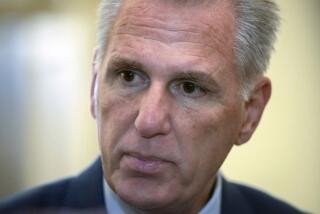Despite shutdown, most federal financial regulators remain on job
WASHINGTON -- Although the federal government began a partial shutdown Tuesday, most financial regulators remained on the job because their agencies are funded outside the congressional appropriations process.
But the effects of the shutdown still will be felt in the financial sector -- and would increase the longer it lasts.
The special mechanisms that pay for most financial regulators -- in many cases through fees on the firms they oversee -- limits the direct consequences of the shutdown on Wall Street and the banking industry.
QUIZ: Test your knowledge about the debt limit
The Federal Deposit Insurance Corp., the Federal Reserve, the Office of the Comptroller of the Currency and the Consumer Financial Protection bureau all are unaffected and fully operating.
Still, the financial industry isn’t completely off the hook as the White House and Senate remain at an impasse with House Republicans over a federal budget resolution.
The Securities and Exchange Commission remains fully open, but is using money carried over from the last fiscal year that probably will last only a few weeks. At that point, the SEC would have to furlough some of its employees.
The agency has not said how many workers would be left on the job., but that it would keep employees who work on law enforcement, market monitoring and surveillance, and operating systems for securities filings.
The Commodity Futures Trading Commission, which oversees futures and options markets, is funded by Congress and will have to furlough 96% of its 680 employees.
The Federal Housing Administration, which insures about 44% of new single-family mortgages, will continue processing loans because that function is paid for through a multi-year appropriation. But the waiting time will increase because the number of employees processing the loans will drop, according to the Department of Housing and Urban Development, which oversees the FHA.
In its shutdown plan, HUD said it did not expect a shutdown would cause a significant impact on the housing market, “as long as the shutdown is brief.” But a longer shutdown “we do expect that potential homeowners will be impacted, as well as home sellers and the entire housing market,” HUD said.
The flow of government economic data, which is crucial to investors, will be choked off by the shutdown.
The Commerce Department, which tracks key economic data such as gross domestic product, consumer spending and foreign trade, said it would not release any reports while the government is closed. The department was scheduled to report August construction spending Tuesday and manufacturing shipments and inventories on Thursday.
The government’s report on September job creation and unemployment, which was set to be released Friday, also could be delayed. The Bureau of Labor Statistics said it would cease operations during a shutdown, although the report could still be released if it was largely completed and the White House determined there was a risk if it were to leak out.
The FDIC and comptroller’s office, which are key banking regulators, are funded by fees charged to financial institutions and are unaffected by the shutdown no matter how long it lasts.
The Federal Reserve, which regulates bank holding companies, is funded through interest on its assets and its oversight functions are not affected. But Fed officials working on monetary policy will not have access to government economic reports as they consider whether to start reducing a key stimulus program.
The consumer bureau gets its annual funding from the Fed, so it remains open and fully functioning as well. Congressional Republicans have been fighting to change the bureau’s funding so it would have to go through the appropriations process, which they argue would provide greater oversight.
But bureau officials and their supporters in Congress have said that the special funding stream was set up so it would be similar to other key financial regulators and removed from the politicking behind congressional budget making.
ALSO:
Five things to watch for in California’s launch of Obamacare
New health insurance exchanges want young, healthy people
Poll: Only 1 in 8 Americans know Obamacare sign-up starts today
More to Read
Inside the business of entertainment
The Wide Shot brings you news, analysis and insights on everything from streaming wars to production — and what it all means for the future.
You may occasionally receive promotional content from the Los Angeles Times.










